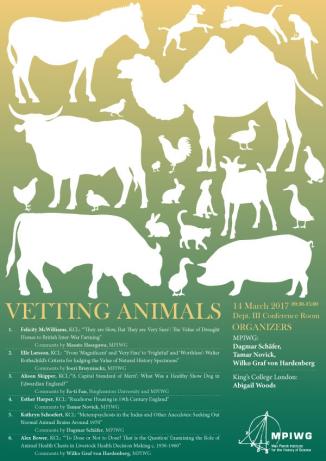Mar 14, 2017
Vetting Animals
- 09:30 to 15:00
- Conference
- Dept. III
- Several Speakers
- Felicity McWilliams
- Elle Larsson
- Alison Skipper
- Esther Harper
- Kathryn Schoefert
- Alex Bower
Related Project(s)
Max-Planck-Institut für Wissenschaftsgeschichte, Boltzmannstraße 22, 14195 Berlin, Germany
Abstract
How are animals valued and judged? This one-day workshop will examine both ends of the decision-making processes: the creation of judgment criteria and their application to the natural world.

On the one side the ability to make judgments and, subsequently, decisions, depends on sets of notions, criteria and standards. Far from being stable categories, such standards vary according to local cultural and political specificities and are reshaped over time. An ideal type, in other words, is neither timeless nor does it exist outside of the geographical and social context within which it was construed. The criteria of judgement on which our decision-making processes are based depend themselves on previous processes in which decisions have been made about which criteria should be applied. We seek thus to understand how judging criteria were constructed in place and time, and how they changed. How, for example, did the ideal English riding horse emerge? What is the best lab animal and how was this decided upon? What are the right measurements of cages for apes in the lab or in the zoo? Do animals feel pain during vivisection?
On the other hand, in order to move from ideal to practice, we examine how judgment criteria operated as the basis for decision-making, and how decisions departed from such criteria. How do stakeholders actually make those decisions about a particular riding, lab, pet, or farm animal in a specific context? What were the tools they used to make a specific judgment, and how did actual decision-making processes depart from the ideal protocol? How have judges dealt with mismatches between the ideal and the real, material and bodily diversity and imperfection? Furthermore, judgment is a learned ability that often depends on the transmission of non-verbal or tacit knowledge. Judgments can also be affected by immeasurable things such as affection or rejection. How do aspirations to make objective judgments, then, align with the fragmented nature of and subjectivity in making judgments, the possible subjective bonds with living organisms, and the inability to explicate the process through which decision are actually made?
The aim of the workshop is to look at issues in which the construction of judgment criteria is analysed and considered in relation to individual animals and species, as well as to spaces, such as the farm, the museum, the zoo, the lab, or the veterinary clinic. We ask, furthermore, whether animals are distinct categories for evaluation, and investigate the ways in which their animacy, materiality, and life complicate the process and meanings of making judgments.
